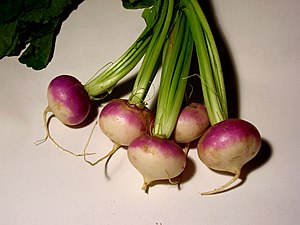turnip
English

Etymology
From Middle English turnepe, probably from turn + Middle English nepe, from Old English nǣp, from Latin nāpus.[1] The component turn may be due to the round shape of the plant as though turned on a lathe, or because it must be turned and twisted to be harvested. Cognate to neep. See also parsnip.
Pronunciation
- Lua error in Module:parameters at line 348: Parameter 1 should be a valid language or etymology language code; the value "UK" is not valid. See WT:LOL and WT:LOL/E. IPA(key): /ˈtɜː.nɪp/
- Lua error in Module:parameters at line 348: Parameter 1 should be a valid language or etymology language code; the value "US" is not valid. See WT:LOL and WT:LOL/E. IPA(key): /ˈtɝ.nɪp/
Audio (US): (file)
Noun
turnip (plural turnips)
- The white root of a yellow-flowered plant, Brassica rapa, grown as a vegetable and as fodder for cattle.
- (Scotland, Ireland, Northern England, Cornwall, Atlantic Canada) The yellow root of a related plant, the swede or Brassica napus.
- (Hong Kong) The white root of Raphanus sativus var. longipinnatus, also known as a daikon.[2]
- (dated) A large, heavy pocket watch, so called because its profile resembled the vegetable.
- (slang) A fool or simpleton.
- 1971, Richard Carpenter, Catweazle and the Magic Zodiac, Harmondsworth: Puffin Books, page 33:
- "Dost thou not believe, thou twittering turnip?"
Synonyms
- (Brassica rapa): summer turnip, white turnip (Cornwall, Scotland)
- (Brassica napus): rutabaga (North America), swede (Ireland, Northern England, Scotland), tumshie (Scotland)
- (Raphanus sativus var. longipinnatus): see daikon
Derived terms
- fall off the turnip truck
- Swedish turnip (Brassica napus)
- turnip watch
- turnip flea beetle (Lua error in Module:parameters at line 822: Parameter "ver" is not used by this template.)
- turnip fly (Lua error in Module:parameters at line 822: Parameter "ver" is not used by this template.)
- turnipy
- Lua error in Module:parameters at line 822: Parameter "ver" is not used by this template.
Descendants
Translations
white root of Brassica rapa
|
yellow root of Brassica napus — see rutabaga
The white root of Raphanus sativus var. longipinnatus — see daikon
large, head pocket watch
|
- The translations below need to be checked and inserted above into the appropriate translation tables. See instructions at Wiktionary:Entry layout § Translations.
Translations to be checked
See also
Verb
turnip (third-person singular simple present turnips, present participle turniping or turnipping, simple past and past participle turniped or turnipped)
- (transitive) To plant with turnips.
- 1803, Agricultural Magazine (volume 9, page 32)
- This identical field has been turniped before, and to good account, in a favourable winter.
- 1803, Agricultural Magazine (volume 9, page 32)
- (transitive) To feed or graze (livestock) on turnips.
- 1869, Sheep: Their Breeds, Management, and Diseases (page 328)
- The Leicesters and half-breds are purchased by farmers who keep no breeding stock: they are well turniped during the winter, and clipped and fattened in the following season.
- 1898, John Wrightson, Sheep: Breeds and Management, page 86:
- This system of turniping is found to encourage the growth and muscular development of young stock.
- 1869, Sheep: Their Breeds, Management, and Diseases (page 328)
References
- ^ Douglas Harper (2001–2024) “turnip”, in Online Etymology Dictionary.
- ^ Patrick J. Cummings, Hans-Georg Wolf (2011) A Dictionary of Hong Kong English: Words from the Fragrant Harbor, Hong Kong University Press, →ISBN, page 178
Anagrams
Categories:
- English terms inherited from Middle English
- English terms derived from Middle English
- English terms inherited from Old English
- English terms derived from Old English
- English terms derived from Latin
- English 2-syllable words
- English terms with IPA pronunciation
- English terms with audio links
- English lemmas
- English nouns
- English countable nouns
- Scottish English
- Irish English
- Northern England English
- Cornish English
- Atlantic Canadian English
- Hong Kong English
- English dated terms
- English slang
- English terms with quotations
- English verbs
- English transitive verbs
- en:Brassicas
- en:Vegetables
- en:Root vegetables
